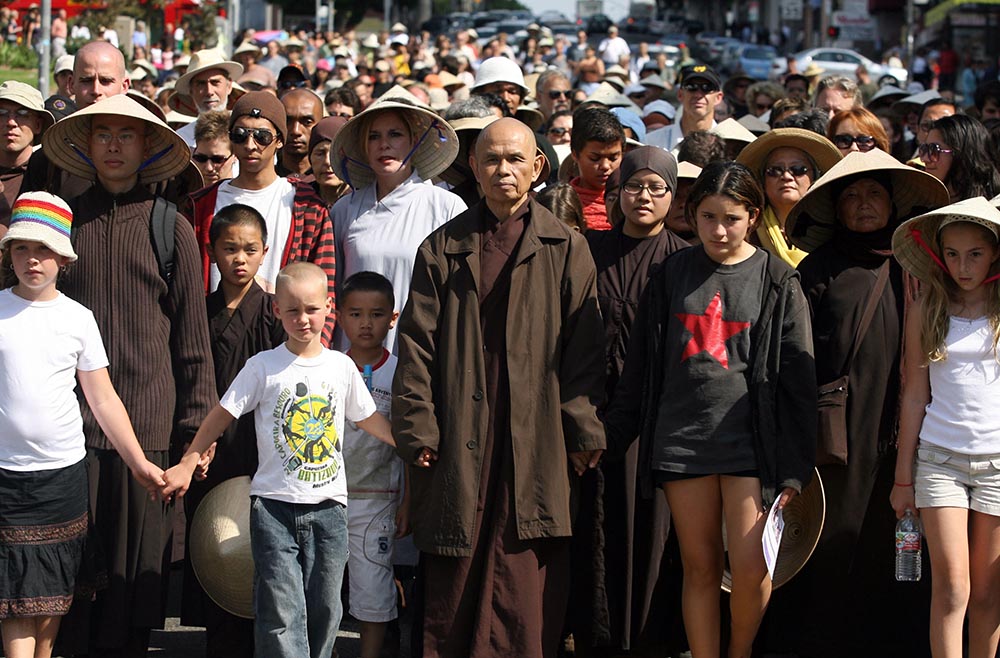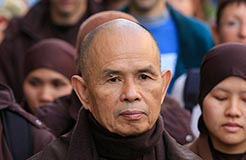News & Views
Thich Nhat Hanh & the Poetry of Engaged Buddhism
Philip Brown presents the poem ‘Recommendation’ and comments on the potential of contemplative art to foster compassion

Thich Nhat Hanh leads thousands of his supporters during a Peace Walk in MacArthur Park in Los Angeles on September 30 2007. Image: ZUMA Press, Inc. [/] / Alamy Stock Photo
Suffering can be a powerful catalyst for the birth of compassion.
The global reach of modern communication technologies enables us to witness the suffering of others in countless parts of the world in a manner and with a frequency that is without precedent in human history. When this suffering is perceived as being caused by aggressors or oppressors, those who suffer and those who observe their suffering often react in a partisan way and feel a partial form of compassion for some of the people involved and not others. Contemplative art has the potential to assist us to process and respond differently to such suffering by fostering that true, full, unconditional compassion which necessarily and importantly acknowledges the past, current and future suffering of both the oppressor and the oppressed, both the aggressor and their victims.
The contemplative poetry of the Buddhist monk Thich Nhat Hanh exemplifies such art. A remarkable but humble teacher, Hanh first came to prominence as a proponent of peace during the Vietnam War (1954–75). This was the first conflict broadcast daily into the homes of millions of people around the world. Today as world news sources transmit countless images of the suffering of combatants and civilians alike in Ukraine and the Middle East, the Vietnam War may still be recalled by those who witnessed its horrors daily on TV. Ordained in the Vietnamese Zen Tradition, Hanh founded The Order of Interbeing [/] in 1966 and was a peace activist, author and Nobel Peace Prize nominee. His spiritual teachings and poetry have profoundly influenced Buddhist practice in Western countries through their focus on mindfulness training and what has become known as ‘Engaged Buddhism’.
According to the Oxford Research Encyclopedias, Engaged Buddhism,[1] also known as ‘Socially- engaged Buddhism’, seeks to apply Buddhist ethics, insights acquired from meditation practice, and the teachings of the Buddhist dharma to contemporary situations of social, political, environmental and economic suffering and injustice. An important injunction of Buddhism is that we should not turn away from the suffering of others because it can be both a catalyst for the development of compassion in ourselves and a motivation to seek the alleviation of suffering of self and others.
During the Vietnam War, in order to alleviate the suffering of Vietnamese people irrespective of their political stance on the war, Hanh established an organisation called the School of Youth for Social Service (SYSS) which embodied the principles of Engaged Buddhism. Its programme combined immediate relief of war-induced suffering with longer-term amelioration of existing problems in rural areas related to health and sanitation, agricultural productivity and literacy. Its student ‘workers’ received careful and intensive training and were deployed as youth volunteers on projects in rural villages.
In the performance of these duties, Hanh and his young volunteers risked their lives on a daily basis. In 1966, after criticising the war and refusing to take sides, Hanh was exiled from Vietnam. Because of their non-partisan position, members of SYSS at times suffered unspeakable barbarity at the hands of both the South Vietnamese Government forces and their opponents, the Vietcong. In response to the suffering and sacrifice of these young Buddhist volunteers, Hanh wrote the heartfelt and heartbreaking poem ‘Recommendation’. It is offered here as an example of the poetry of Engaged Buddhism and the role that contemplative poetry can play in exploring the suffering of others and evoking compassion. It is as relevant today as when it was written.
Recommendation
by Thich Nhat Hanh
Promise me,
promise me this day,
promise me now,
while the sun is overhead
exactly at the zenith,
promise me:
Even as they
strike you down
with a mountain of hatred and violence;
even as they step on you and crush you
like a worm,
even as they dismember and disembowel you,
remember brother, remember:
man is not our enemy.
The only thing worthy of you is compassion –
invincible, limitless, unconditional.
Hatred will never let you face
the beast in man.
One day, when you face this beast alone
with your courage intact, your eyes kind,
untroubled
(even as no one sees them),
out of your smile
will bloom a flower.
And those who love you
will behold you
across ten thousand worlds of birth and dying.
Alone again,
I will go on with bent head,
knowing that love has become eternal.
On the long, rough road
the sun and moon will continue to shine.[2]
The hurt and sorrow we feel when we experience the suffering of others can engender empathy, the seed of compassion. Sadly, when suffering is caused by an oppressor or an aggressor, it can be difficult to respond with the equanimity and unconditional compassion recommended by Thich Nhat Hanh. This is especially so when our natural, pure, ever-present nondual awareness is strongly masked by dualistic thinking and the emotional partiality which arises from it. But it is these very qualities of equanimity and unconditional compassion, rather than anger, which were so desperately needed during the Vietnam War, and are required of us now in response to the wars in Ukraine, the Middle East and elsewhere.
Hatred will never let you face
the beast in man.
Sources (click to open)
[1] ANN GLEIG, ‘Engaged Buddhism’ in The Oxford Research Encyclopedia of Religion (Oxford University Press, 2021) (https://oxfordre.com/religion/display/10.1093/acrefore/9780199340378.001.0001/acrefore-9780199340378-e-755).
[2] THICH NHAT HANH, ‘Recommendation’, 18 May 2019, Plum Village website [/].
Philip Brown is an independent researcher in the field of Contemplative Studies. He spent his working life teaching children with severe and multiple disabilities and co-developed training programmes to prevent the physical and sexual abuse of these children. For many years he has been a student of the Tibetan Buddhist Teachings called Dzogchen, and since the age of 14 when he first read Aldous Huxley’s The Perennial Philosophy, he has had an abiding interest in this philosophy and the field of comparative religion.
The text of this article has a Creative Commons Licence BY-NC-ND 4.0 [/]. We are not able to give permission for reproduction of the illustrations; details of their sources are given in the captions.
read more in beshara magazine
More News & Views
Book Review: ‘The Serviceberry’
Martha Cass contemplates the message of a new book by Robin Wall Kimmerer that advocates ‘an economy of gifts and abundance’
Book Review: ‘Conversations with Dostoevsky’
Andrew Watson engages with an innovative new book by George Pattison which explores Dostoevsky’s relevance in the contemporary world
Introducing… ‘Perfect Days’ and ‘Nowhere Special’
Jane Clark watches two films with a contemplative theme
Book Review: ‘Irreducible: Consciousness, Life, Computers and Human Nature’
Richard Gault reviews a new book by Federico Faggin, one of the leading lights of the science of consciousness
An Irish Atlantic Rainforest
Peter Mabey reviews a new book by Eoghan Daltun which presents an inspiring example of individual action in the face of climate change
In Memory of Bill Viola (1951–2024)
Jane Carroll pays tribute to the acclaimed video artist, who died on July 12th 2024
FOLLOW AND LIKE US
——————————————
——————————————
——————————————
If you enjoyed reading this article
Please leave a comment below.
Please also consider making a donation to support the work of Beshara Magazine. The magazine relies entirely on voluntary support. Donations received through this website go towards editorial expenses, eg. image rights, travel expenses, and website maintenance and development costs.
READERS’ COMMENTS
2 Comments
Submit a Comment
FOLLOW AND LIKE US


This is so very true, beautiful and timely. Thank you!
Thank you Philip – this is so inspiring, moving and a light.